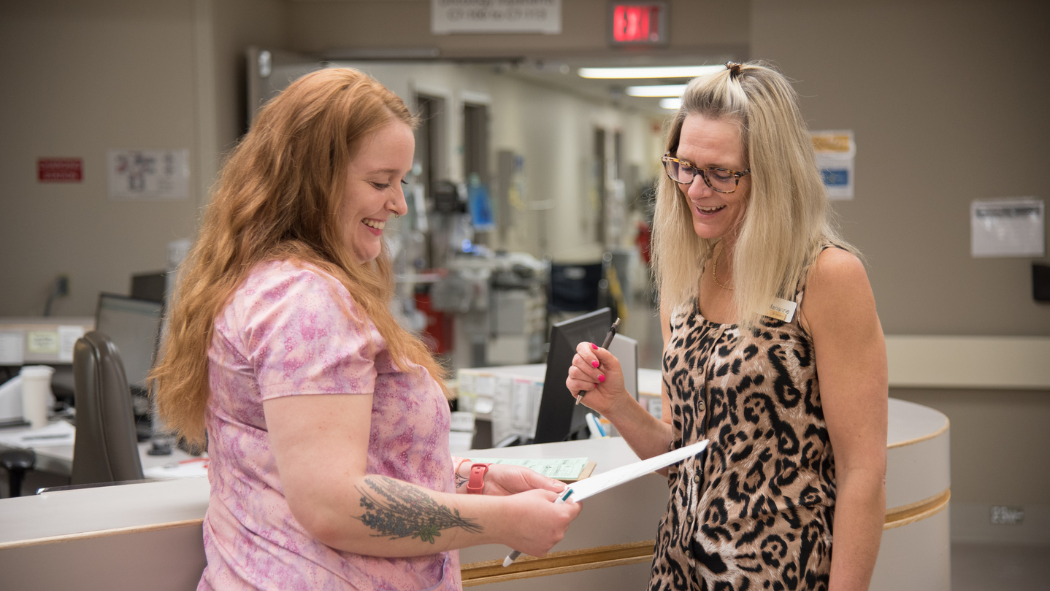
March 21, 2024
“All of my duties revolve around supporting patient care - part of which includes nutrition. Food is one of the most important things for a person’s stay in hospital and being able to provide breakfast, lunch, dinner, snacks – that’s critical to a patient’s experience and their recovery,” says Katelyn Mills, Personal Support Worker (PSW), C7 Oncology, at London Health Sciences Centre (LHSC).
On an interprofessional team, there are many individuals who work together to ensure patients receive the appropriate diet and nutrition they need. As a PSW, Mills’ role comes after dietitians and dietetic assistants have met with the patient and discussed their dietary needs, nutrition care goals and informed them on what to expect regarding any necessary dietary changes that may be required during their stay. PSWs are also instrumental in overcoming many known barriers to adequate food intake in hospital. They help open and unwrap food packages, help patients get into a proper position to eat, provide feeding assistance when needed and make sure that food and beverages are left within reach of the patient.
“I help with the daily needs and challenges which includes encouraging more protein rich foods and beverages, counting caloric intake after each meal and promoting oral intake, especially while patients may be nauseated or fatigued from chemotherapy,” explains Mills. “Reporting accurate intake and output, calorie counts and documentation of additional snacks and beverages is crucial for the patients’ physical wellbeing and recovery.”
Mills records patient intake after each meal which Marianne Den Otter, Dietetic Assistant, collects the following day to analyze and give to the dietitian for further consideration of strategies to optimize nutritional intake, whether through oral nutritional supplement enhancement, tube feed or total parenteral nutrition (TPN) considerations.
Calorie counts are imperative to Den Otter’s work. When Mills collects this information, they get a more accurate understanding of a patient’s nutrition intake while in hospital to ensure they are eating enough or see where they may need to adjust the diet, to meet the specific needs of the patient.
“I am proud to work collaboratively with Katelyn. We each bring a unique perspective to ensuring patients get the nutrition they need and that they enjoy the food they are given at mealtimes,” Den Otter says. “We each have our areas of expertise and the ways in which we interact with patients differs, so to be able to connect and bring our knowledge to the table together to find what will work best for patients is valuable and fulfilling.”
The importance of food
“Food is everything,” Mills says. “Meals are an important part of a patients’ day, and we want patients to look forward to them. Meeting nutrition and dietary needs is a crucial foundation for a person’s physical and mental wellness. I consider supporting the nutrition intake of patients to be one of the most important aspects of my role as a PSW for this reason.”
Mills is also aware of the significant role that food can play beyond a nutritional perspective. Food is not just a way to get appropriate nutrients, it is something that can make a person feel comfortable and can bring people together.
“Mealtime is where I often get an opportunity to talk with patients,” Mills says. “I get to learn more about who they are, their likes and dislikes. When it comes to food specifically, I can learn their preferences and speak with Marianne about the possibilities of updating their menu or providing alternate options.”
“Nutrition intake is an important part of a patient’s recovery,” Den Otter emphasizes. “The work Katelyn and other PSWs do to encourage eating and record accurate food intake and preferences is crucial to a positive and people-centred care experience.”
